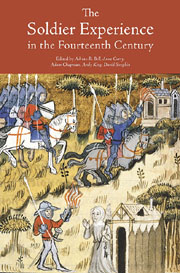Book contents
- Frontmatter
- Contents
- List of Contributors
- List of Abbreviations
- Introduction
- 1 Military Service and the Dynamics of Recruitment in Fourteenth-Century England
- 2 Total War in the Middle Ages? The Contribution of English Landed Society to the Wars of Edward I and Edward II
- 3 A Warlike People? Gentry Enthusiasm for Edward I's Scottish Campaigns, 1296–1307
- 4 Edward I's Centurions: Professional Soldiers in an Era of Militia Armies
- 5 Who's afraid of the Big Bad Bruce? Balliol Scots and ‘English Scots’ during the Second Scottish War of Independence
- 6 Rebels, Uchelwyr and Parvenus: Welsh Knights in the Fourteenth Century
- 7 Breton Soldiers from the Battle of the Thirty (26 March 1351) to Nicopolis (25 September 1396)
- 8 Towards a Rehabilitation of Froissart's Credibility: The Non Fictitious Bascot de Mauléon
- 9 The English Reversal of Fortunes in the 1370s and the Experience of Prisoners of War
- 10 The Soldier, ‘hadde he riden, no man ferre’
- Index
- Warfare in History
3 - A Warlike People? Gentry Enthusiasm for Edward I's Scottish Campaigns, 1296–1307
Published online by Cambridge University Press: 05 February 2013
- Frontmatter
- Contents
- List of Contributors
- List of Abbreviations
- Introduction
- 1 Military Service and the Dynamics of Recruitment in Fourteenth-Century England
- 2 Total War in the Middle Ages? The Contribution of English Landed Society to the Wars of Edward I and Edward II
- 3 A Warlike People? Gentry Enthusiasm for Edward I's Scottish Campaigns, 1296–1307
- 4 Edward I's Centurions: Professional Soldiers in an Era of Militia Armies
- 5 Who's afraid of the Big Bad Bruce? Balliol Scots and ‘English Scots’ during the Second Scottish War of Independence
- 6 Rebels, Uchelwyr and Parvenus: Welsh Knights in the Fourteenth Century
- 7 Breton Soldiers from the Battle of the Thirty (26 March 1351) to Nicopolis (25 September 1396)
- 8 Towards a Rehabilitation of Froissart's Credibility: The Non Fictitious Bascot de Mauléon
- 9 The English Reversal of Fortunes in the 1370s and the Experience of Prisoners of War
- 10 The Soldier, ‘hadde he riden, no man ferre’
- Index
- Warfare in History
Summary
One of Edward I's defining characteristics is his single-mindedness, and his conduct of war in the last decade of his reign is one of the most conspicuous examples of this. Edward had clear objectives in mind: from 1294 to 1297, the recovery of Gascony, and from 1298 onwards the subjection of Scotland; and he was not going to allow anyone or anything to stand in his way if he could possibly help it. This article examines how willing the English gentry were to aid their king in his struggles.
Edward is generally recognised as having created a harmony of interests between Crown and gentry in his domestic governance of England but, as the political tension of the years between 1297 and 1301 demonstrate, the domestic harmony Edward had created in the first two decades of his reign was fractured somewhat by the almost constant warfare between 1294 and 1307. Opposition to the king's policies, led by the earl of Norfolk and the archbishop of Canterbury, played to the concerns of the gentry rather than the nobility: taxation, the royal forest, the prise, the attack on franchises, and the extension of the king's military demands to those of relatively modest means. To what extent did the gentry vote with their feet during these years?
To try and answer this question lists of landholders have been drawn together from three different sources and then compared to the extensive, if incomplete, sources we have for the campaigns after 1294.
- Type
- Chapter
- Information
- The Soldier Experience in the Fourteenth Centur , pp. 95 - 108Publisher: Boydell & BrewerPrint publication year: 2011



